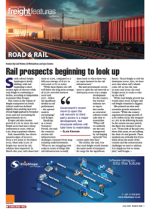Across Africa, rail is making a strong comeback as countries increasingly recognise its vital role in unlocking trade and accelerating economic growth. According to Mesela Nhlapo, CEO of the African Rail Industry Association (Aria), renewed investment in rail infrastructure by governments across the continent aligns with the African Union’s (AU) vision for a modern, integrated transport network that spans the continent.“The AU has called for an integrated transport sector with world-class infrastructure that crisscrosses the continent. The current projects taking place in several countries are responding to that vision.”She said rail played a central role in enabling the African Continental Free Trade Area (AfCFTA) as, without a connected, land-based transport system linking Africa’s cities and capitals, the continent’s 2063 development aspirations would remain out of reach, and increasing intra-African trade would be near impossible.Achieving AfCFTA goals“Railway supports the AfCFTA. If we are supposed to trade with each other as Africans, but don’t have transport that connects our cities and capital cities, we will not be able to achieve the goals of the Africa we all envision and want,” she said.According to Nhlapo, more than eight African countries have made significant investments in expanding and modernising their rail systems. Despite renewed interest, Africa’s railways still lag significantly behind global standards. Most networks remain low-density, with South Africa, Morocco and Egypt accounting for around 80% of the continent’s total rail activity.Rail gauge variationsCompounding the challenge is a lack of interoperability between countries — not only is infrastructure limited, but variations in rail gauges and regulatory frameworks further hinder cross-border connectivity.Yet, said Nhlapo, the potential for rail development across Africa is immense, driven by rising transport demand, economic growth, new mining and resource ventures, and the growing need for landlocked countries to access seaports and global trade routes.There’s huge potential for rail development thanks to rising transport demand and economic growth, expanding urbanisation and new mining and resource ventures. In addition, the landlocked countries need access to seaports, and global trade routes have put focus back on rail.Several new and upgraded rail projects are highlighting the increased focus on rail. Among them is the Kano-Maradi Railway, a 393km line set to begin operations this year, linking Nigeria to Niger with a projected daily freight capacity of 3 000 tons. In southern Africa, the Lobito Corridor Trade Facilitation Project spans 1 344km, connecting Angola, Zambia and the DRC in a bid to stimulate both domestic and cross-border trade. Similarly, the hist or ic Ta za ra Railway, linking Zambia to the Tanzanian port of Dar es Salaam is undergoing a $1bn upgrade to boost mineral exports to the east.Other projects include a 1 522km standard-gauge line planned to connect Ethiopia and Sudan, as well as the Trans-Kalahari Railway, a 1 500km route linking Botswana to the Namibian port of Walvis Bay. In West Africa, the Transguinean Railway will stretch 670km from Beyla to Forécariah in Guinea, while the Ghana-Burkina Faso Interconnectivity Project aims to establish a 1 200km rail link between the two countries. Further north, Senegal has plans to upgrade its rail infrastructure, while talk of a link between Zimbabwe and Zambia continues.According to Nhlapo, rail infrastructure in Africa is one of promise and persistent challenges. Sustainable investment“Rail remains capital-intensive and dependent on smart, inclusive investment strategies. Countries must find sustainable ways to invest. While partnerships with players like China have brought in funding, the structure of these deals matters. Often, loans are tied to buying Chinese equipment and hiring Chinese labour, rather than empowering local industry and youth. That cannot be our long-term model.”She stressed that for investmentto serve future generations, African governments must build capacity to “handle these projects ourselves” and “negotiate better deals that benefit our people”.Nhlapo also criticised fragmented national planning, urging governments to develop regional, multimodal strategies that align with neighbours.“Failing to plan with our brothers and sisters means failing to implement intra-African trade,” she said. “Most countries have rail master plans that are inward-looking. If we truly want integration, these must be regional at the very least – they must talk to our neighbours’ plans, not just our own.”LV
Lack of rail interoperability stymies progress
26 Jun 2025 - by Liesl Venter
0 Comments
Road & Rail 27 June 2025

26 Jun 2025
26 Jun 2025
26 Jun 2025
26 Jun 2025
26 Jun 2025
26 Jun 2025
26 Jun 2025
26 Jun 2025
26 Jun 2025
26 Jun 2025
26 Jun 2025
Border Beat
25 Jun 2025
17 Jun 2025
Poll
Featured Jobs
New
